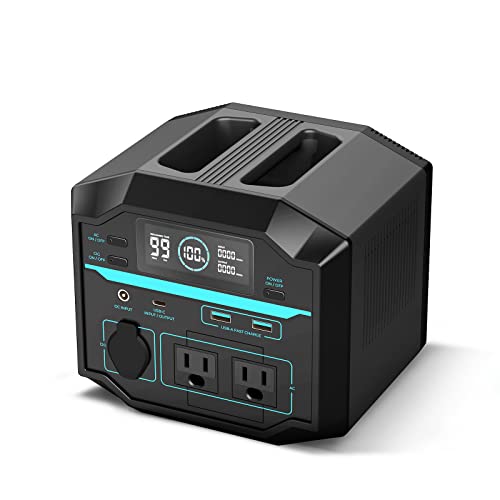In the ever-expanding world of portable power solutions, choosing the right backup can feel like navigating a labyrinth. Today, we’re comparing two formidable competitors in portable power: the Renogy 200 and the Bluetti AC200P. From campers and travelers to emergency preppers and eco-conscious individuals, join us as we delve into the details that could power your decision.
Key Specifications Head-to-Head
| Renogy 200 | Bluetti AC200P | |
|---|---|---|
| Battery Capacity | 222Wh | 2000Wh |
| AC Outlet | 200W with 400W surge | 6 x 120V/20A, 2000W total with 4800W surge |
| USB Ports | USB-A & USB-C | USB-A & USB-C 60W Max |
| DC Output | CIG Port | 12V/25A RV, 12V/10A Car, 2 x 12V/3A |
| Solar Charging Compatibility | Yes | Yes |
| Weight | 5.3 pounds | 60.6 pounds |
| Dimensions | 7.48 x 6.10 x 6.99 inches | 16.5 x 11 x 15.2 inches |
| Charging Methods | AC, USB-C, Car, Solar | AC, Solar, Car |
| Recharge Times | 80% in 1.5 hours | AC 4.5~5h, Solar 3.5~4h, Car 10/20h |
| Lifecycle | Undefined | 3500+ cycles to 80% capacity |
| Accessories | Solar panels, Refrigerator, Cables | Solar panels, Cables, Enhancer, Expansion Battery |
Capacity and Output: How Much Power Do You Need?
The Renogy 200, a svelte and easy-to-carry unit, offers a 222Wh battery capacity, fitting for those who need a light touch – like charging drones or CPAP machines at a campsite. Meanwhile, the Bluetti AC200P boasts a whopping 2000Wh, making it a heavyweight champion for those with energy-hungry devices or a need for extensive home backup power.
Charging and Recharging: Speed and Convenience
When it’s a race against time, the Renogy 200 leads with its agile rechargeability, hitting 80% in just 1.5 hours with dual inputs. On the other hand, the Bluetti AC200P offers diverse charging options including a substantial solar input, ensuring you’re prepared, irrespective of the situation.
Portability: Size Matters
If you’re constantly on the move, the Renogy 200’s compact design and light build are advantages you can’t overlook. Contrastingly, the Bluetti AC200P, with its larger size and heavier build, is more of a set-and-forget solution or ideal for stationary uses such as RVs and home backup where its weight won’t be an issue.
Durability and Lifecycle: The Longevity Game
The eco-minded will appreciate the longevity of Bluetti AC200P’s lithium iron phosphate battery, which holds 3500+ cycles before dropping to 80% capacity, making it a long-term investment. The cycle life for the Renogy 200 hasn’t been specified, so it may suit those less concerned with the wear-and-tear of frequent use.
Expandability and Additional Features
The capability to expand and adapt your power needs is crucial for some users. Bluetti edges out in this department with accessories like battery expansion and a DC charging enhancer, providing a solution that grows with your power requirements.
Protection and Safety Features: Security in Power
Both units come equipped with a range of safety features. The Renogy 200 brings multi-intelligent BMS protection to the table, safeguarding your experience, while Bluetti’s formidable BMS ensures your high-capacity unit stays within the safe operating zone.
Eco-Friendliness: Harvesting the Power of the Sun
Our contenders both champion solar charging, so for those looking to tap into renewable sources, either unit will serve well. The Renogy 200’s compatibility with monocrystalline panels makes it a mobile sun-chaser, whereas the Bluetti AC200P, with a higher solar wattage intake, plants its feet firmly as a stationary solar hub.
Conclusion: Which One Wins Your Watts?
Identifying the right portable power station depends on matching your specific needs to the features on offer. The Renogy 200 excels in portability, swift recharging, and light-duty power provision. The Bluetti AC200P, with its gargantuan power storage and expandability, caters to those with more demanding power needs or the requirement for an extensive backup solution. Both units stand to redefine your electric independence and how you interact with power on the go or at home.
Share Your Power Stories
Got any experience with these portable power stations, or have questions before making a purchase? Feel free to share your stories or ask for advice in the comments below. Let’s empower each other with knowledge!




Leave a Reply